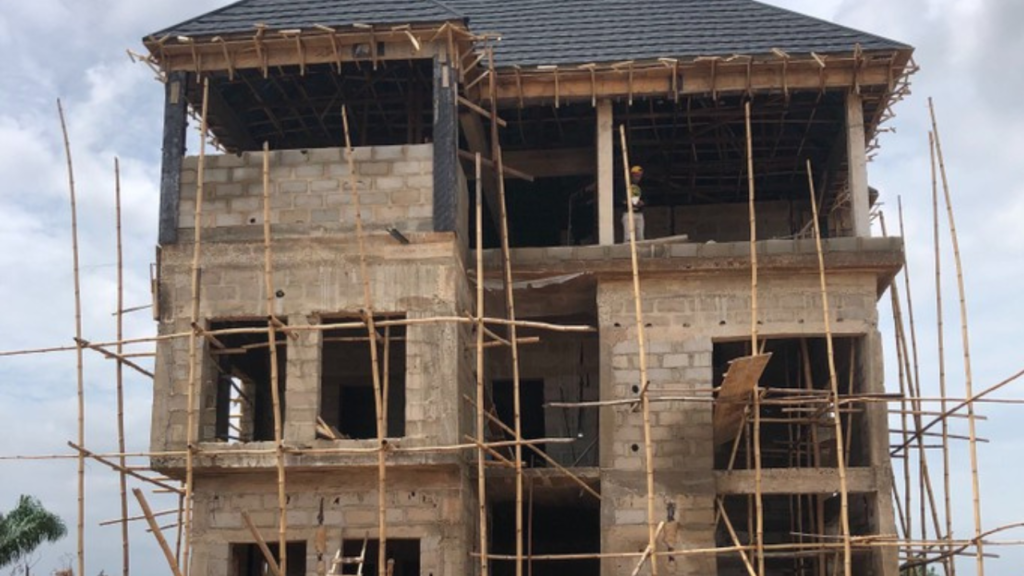Building a house in Nigeria can be expensive due to rising material costs, labor charges, and inflation.
However, you can reduce expenses without compromising on quality.
Smart planning, proper budgeting, and making informed choices can help you save money while maintaining a durable and beautiful structure.
Bullionrise consult will outline practical ways to cut costs on your building project without sacrificing quality.
Table of Contents
Toggle
1. Plan and Budget Properly
A well-structured plan prevents unnecessary spending and delays.
How can you archive this?
- Hire a qualified architect to design a cost-effective yet functional building plan.
- Get a quantity surveyor to estimate the exact amount of materials needed to avoid wastage.
- Set a budget that includes hidden costs such as permits, labor, and unexpected expenses.
2. Buy Land in Affordable Yet Developing Areas
Land in prime locations is more expensive. Buying in developing areas reduces costs while offering future value appreciation.
How can you archive this?
- Look for government-approved lands in growing neighborhoods with good infrastructure.
- Verify land documents to avoid legal issues that could result in extra costs.
3. Choose a Cost-Effective Yet Durable Design
Complex designs require more materials and labor, increasing costs.
How can you archive this?
- Opt for simple, compact designs with minimal structural complexity.
- Reduce unnecessary features like excessive columns, curves, or oversized windows.
- Use open floor plans to maximize space without extra walls.
See also – The 11 Different Types of House Design in Nigeria (with pictures)
4. Buy Materials in Bulk and at the Right Time
Buying in bulk reduces costs and prevents price fluctuations.
How can you archive this?
- Purchase materials directly from manufacturers or wholesalers instead of retailers.
- Buy cement, rods, and other materials during off-peak seasons when prices are lower.
- Consider group buying with other builders to get better discounts.
5. Use Alternative and Locally Sourced Materials
Imported materials are expensive due to exchange rates and transportation costs.
How can you archive this?
- Use locally made blocks instead of imported ones.
- Consider concrete roofing tiles instead of expensive aluminum sheets.
- Use laterite instead of sharp sand where applicable.
6. Hire Experienced but Affordable Professionals
Skilled workers do the job right the first time, reducing errors and rework costs.
How can you archive this?
- Hire qualified but reasonably priced engineers, masons, and carpenters.
- Get multiple quotes and negotiate fees.
- Supervise the project closely to prevent laborers from inflating material usage.
7. Avoid Waste and Theft
Material theft and wastage can significantly increase costs.
How can you archive this?
- Store materials in a secure location with proper inventory tracking.
- Use precise measurements to avoid cutting excess wood, iron rods, or tiles.
- Employ trusted site supervisors or install CCTV cameras for security.
See also – How do I find reliable building contractors in Nigeria?
8. Build in Phases if Necessary
Spreading construction over time reduces financial pressure.
How can you archive this?
- Start with the foundation and structural work, then complete the finishing later.
- Use a pay-as-you-go approach if you don’t have all the funds at once.
- Prioritize essential parts of the building before luxury features.
See also – Building a House Step by Step in Nigeria | Ultimate Guide
9. Consider Precast and Modular Construction
Precast elements save time and labor costs while maintaining quality.
How can you archive this?
- Use precast concrete slabs instead of traditional cast-in-place concrete.
- Consider modular building materials that reduce on-site construction time.
10. Avoid Unnecessary Government Fees and Legal Issues
Non-compliance with regulations can result in fines, legal battles, or demolition.
How can you archive this?
- Obtain all necessary permits before starting construction.
- Follow approved building codes to avoid future expenses.
- Work with licensed professionals to prevent legal complications.
See also – What are the requirements for building approval?
Conclusion
Saving money on your building project in Nigeria does not mean using inferior materials or poor workmanship.
With proper planning, smart material choices, labor efficiency, and cost-effective designs, you can build a high-quality home within your budget.
Always work with trusted professionals, avoid shortcuts, and monitor the project closely to ensure value for your investment.
Frequently asked questions
What are the best ways to reduce construction costs without sacrificing quality?
Efficient planning is key create a realistic budget and stick to it to avoid unnecessary expenses.
Choose reputable contractors who can balance cost-effectiveness with quality workmanship.
Avoid last-minute design changes, as they often lead to costly delays and waste.
Prioritize essential features and materials over luxury finishes to manage costs while maintaining quality.
How can I choose cost-effective materials for my building project?
Opt for durable yet affordable materials like concrete blocks instead of bricks where feasible.
Compare prices from multiple suppliers and consider locally sourced materials to save on transportation costs.
Use substitutes like engineered wood instead of hardwood, as long as they meet quality standards.
Consulting a professional can help identify cost-effective options without compromising durability.
What role does proper planning play in saving money during construction?
Proper planning prevents costly mistakes by ensuring all aspects of the project are well-organized and accounted for.
It allows you to set a clear timeline, allocate resources efficiently, and avoid delays.
Early planning also helps identify potential risks or extra costs, enabling you to address them before they escalate.
A detailed blueprint minimizes wastage and keeps your project on track financially.
Are there specific techniques to minimize waste and optimize material use?
Accurate measurements during design and construction reduce excess material waste.
Reusing leftover materials, like bricks or wood, for other parts of the project can save money.
Efficient construction techniques, such as prefabrication, ensure materials are used effectively.
Educating workers on waste management practices further helps minimize unnecessary expenses.
How can technology help in managing construction costs effectively?
Technologies like Building Information Modeling (BIM) provide accurate cost estimates and help detect design flaws early.
Project management software can monitor expenses in real time and ensure budgets are adhered to.
Using advanced tools or equipment also enhances construction speed and precision, reducing labor costs.
Embracing technology streamlines the process, ultimately saving time and money.










